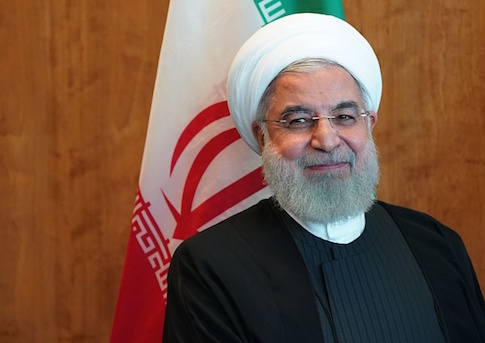The Trump administration's new sanctions on Iran, which came into effect on Monday, omit half of key entities tied to Tehran's army forces and hardline paramilitary group known for conducting terror operations across the globe, according to a new analysis by a top watchdog organization.
New U.S. sanctions on Iran—which have come under fierce criticism by Iran hawks in Congress and elsewhere for providing major concessions to Iran and its European business partners—have failed to cover "half of the publicly listed firms under the principal control of the regime's security forces," according to research conducted by the Foundation for Defense of Democracies, a think tank that has worked closely with the administration on national security issues.
The failure of the new sanctions to hit these key sources of funding for the hardline Iranian regime is likely to provide further grist to Iran hawks in Congress and their allies who have expressed frustration over what they say is the Trump administration's failure to uphold its vow to fully sanction Iran and choke off the regime's primary funding sources.
The Washington Free Beacon first reported last week that the administration has made a series of last-minute concessions to Iran and its European partners that some have warned will leave Tehran the financial resources to continue its rogue military and terrorist operations across the globe.
This includes permitting Iran to continue sensitive nuclear research work at several military facilities known to have once housed a weapons program. Additionally, Iran will not be fully cut off from the international banking system and will be allowed to continue exporting crude oil to at least eight countries—concessions the administration once vowed would not take place.
New analysis of the sanctions on some 700 Iranian entities now shows the administration failed to sanction a score of key entities that fund Iran's hardline regime.
"The Armed Forces of the Islamic Republic of Iran owns more than 50 percent of the shares—or controls more than 50 percent of the seats on the boards of directors—of 22 TSE-listed companies," according to FDD. "These firms encompass a variety of industries, including finance, energy, construction, automotive, and telecommunications, among others. Eleven of the 22 companies fall under the Armed Forces' general jurisdiction."
These companies constitute a critical financial lifeline for Iran and are likely to become another source of frustration among Iran hawks pressuring the Trump administration to make good on its promise to wage a "maximum pressure" campaign on Tehran.
"The United States should resolve these discrepancies by sanctioning all 11 companies that so far have escaped designation," FDD said in its policy brief. "In so doing, the Trump administration can ensure that its maximum pressure campaign targets the full spectrum of actors responsible for facilitating Iran's malign conduct."
Those entities that escaped the new U.S. sanctions are all directly tied to Iran's fighting forces, FDD found.
![]()
"The Armed Forces includes the Islamic Revolutionary Guard Corps (IRGC), the regime's praetorians; the Law Enforcement Force (LEF) of the Islamic Republic of Iran, the state police; the Basij, or religious police; the Artesh, or conventional military; the General Staff of the Armed Forces; and the Ministry of Defense and Armed Forces Logistics (MODAFL)," according to information provided by FDD.
"Supreme Leader Ayatollah Ali Khamenei, the commander-in-chief of the Armed Forces, directly appoints the heads of all of them except the MODAFL," according to the information. "The United States had already designated the IRGC, the LEF, the Basij, and the MODAFL prior to Monday's sanctions."
While the administration sanctioned six companies under the Iranian Armed Forces control on Monday, when sanctions snapped back in part, the Trump Treasury Department "has yet to sanction the remaining five, which they should do in light of their ties to other firms that Treasury designated on Monday," according to FDD.
These companies include "Pardis Perochemical Company, Shiraz Petrochemical Company, Tabriz Oil Refinery, and Kermanshah Petrochemical Industries[, which] are subsidiaries of Parsian Oil and Gas, while Ghadir Investment controls the International Construction Development Company."
"Treasury also has never sanctioned the remaining six IRGC-backed firms—Iran Mineral Products Company, Iran Tractor Foundry Company, Iran Tractor Motors Manufacturing Company, National Iranian Lead & Zinc, Telecommunication Company of Iran, and Mobile Telecommunication Company of Iran," FDD found.
![]()
Mark Dubowitz, FDD's chief executive, told the Free Beacon that while the Treasury Department has done good work to ratchet up pressure on Iran, more can and must be done.
"Treasury’s unprecedented pressure campaign against the Islamic Republic of Iran can be dialed up further by designating the remaining publicly-traded companies owned by the IRGC and the armed forces," Dubowitz said.
